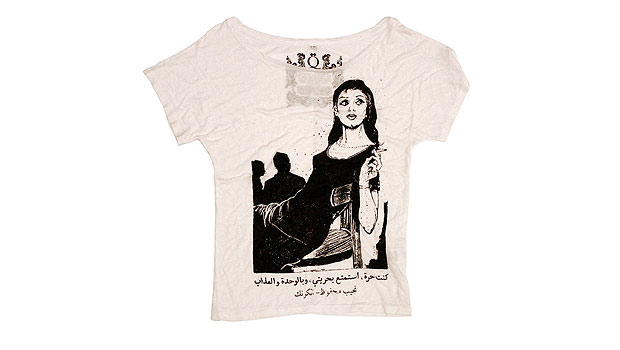The brand, Qabila Apparel, is a homegrown Khaleeji clothing line specialized in the production and retail of high quality casual wear and accessories based on concepts sourced from local Middle Eastern artists and graphic designers. Qabila is dedicated to creating wearable art that is made “for us, by us” by tapping local design energy and embracing their frustration, happiness, angst and humor of our culture.
Intense and intriguing, their print makes you think. The first collection of Qabila includes an intriguing piece with an actual illustration from a Naguib Mahfouz novel, titled “Al-Karnak.” It quotes: “I was free, enjoying my freedom, and loneliness and its torture,” as a girl lies back on a chair looking away into the distance. The others are a bridge between language and ideas that are most popular in the Arab region (even Pepsi is spelled as “Bebsi,” as it is pronounced in Arabic). The idea and concept is a twist and play of controversial art used in a young-spirited fashion line.
All Qabila Apparel designs are sourced from local artists. Their clothing line proves their ultimate belief in the region’s capabilities and creativity, which is a vehicle to carry voices. Some of these voices are angry, some are sad and some are humorous. They only have one guideline: Reference our culture.
Ghassan Aloshban and Balquis Alrashed are the co-founders of Qabila. “We are all part of one pan-Arabic Qabila, and the brand is ultimately dedicated to celebrating this notion and its aesthetics,” Aloshban told Arab News. He delves deep into the history of Arab civilization and re-tells a tale of his father and how he unconsciously helped conjure up the identity of the brand. He speaks to Arab News exclusively for the first time.
The Middle East has such a rich visual heritage, from traditional arts like calligraphy, to pop-consumer art like hand drawn Egyptian movie posters. As a label, we ultimately want to celebrate this rich heritage and the artists that sprang forth from it and the direction they wish to take it. As such, it's difficult to say exactly where the artists we collaborate with and will be collaborating with in the future will be taking this culture. We're trying to function as a loudspeaker for these voices, and in doing so, we are quite content-neutral. The voices we receive have been happy, sad, angry, frustrated, irreverent and patriotic, to name a few. It's not our place to dictate how they feel; we're simply attempting to sharpen the message and make sure the designs we select to print, regardless of the subject matter, are powerful and elicit an emotional response.
We wanted a brand name that really captured the essence of being Arabic. My father is an anthropologist and he was always interested in exploring what it meant, philosophically, to be Arabic. For his Ph.D, he decided to write his thesis on the tribe as a political unit. He researched tribal culture in the Arab world in general and Saudi Arabia specifically to write his dissertation, and our family sometimes accompanied him when he went on field studies, so the word has always captured my imagination. The word “Qabila” actually comes from the root word, which means "accept." The literal emphasis of the word Qabila is inter-group and community. Balquis, the co-founder, and I feel that we belong to one pan-Arabic Qabila with a shared history and culture, and the brand is ultimately dedicated to celebrating this notion and its aesthetics.
When I first thought about pursuing the idea around 2005, there were few if any Arabic casual-wear brands out there, but I felt I wasn't ready to take the plunge professionally. It was only after going to business school that I wanted to turn the idea into a venture. By then, a number of local brands had sprung up that were speaking to the same market, but I felt they all had a specific voice or identity. I wanted to create a label that provided a podium for artists, hobbyists or professionals, to express themselves rather than dictate an identity for the brand.
We are admittedly in the higher price bracket, with pieces retailing in the range of SR200 to SR300, but the quality really justifies the price. We source the finest ultra-soft tight-knit jersey cotton and organic material and use the same print-house as Alexander McQueen in London for our silk screening, so our cost of production is quite high.
We design some T-shirts in-house. Balquis is an amazingly talented artist in her own right, who has actually exhibited some of her collage pieces at Athr gallery with a very interesting perspective. But most of our designs are crowd sourced from local Middle Eastern artists that we either contact directly or who contact us for submissions. Our only criteria for publishing designs are their conceptual strength and connection to Middle Eastern culture, so artists please contact us!
Cream Boutique, Stars Avenue Mall; Sawani, Red Sea Mall; Sawani, Basateen Mall; and The Wall, Tahliya
Sawani, Alfaisaliah Mall
Sawani, Rashed Mall and The Wall, Rashed Mall
Sauce, Dubai Mall; Sauce, Village Mall and The Zoo, Villa 142 Jumeira Beach Road
Sauce, Marina Mall









